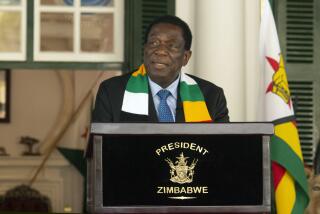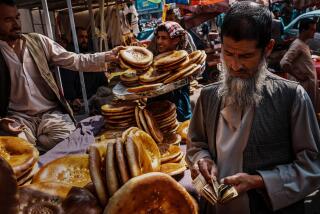Many Afghans Loath to Have Their Vote Scrapped
- Share via
KABUL, Afghanistan — If the 15 candidates who have protested the conduct of this country’s first democratic presidential election persist, they may need to tangle with Aji Ghulem Rasul, a 67-year-old, barrel-chested former wrestler.
Like many Afghans, Rasul, a baker and member of the Hazara community, was indignant Sunday when he heard that some candidates wanted to annul the election -- a poll in which he and millions of other Afghans experienced the right to vote. And all because some voters supposedly were marked with erasable ink, he scoffed, sticking out his own hand to show a stubby, ink-stained thumb.
Rasul’s point was that the candidates posing the objections were sore losers and that the ink scandal was not widespread enough to invalidate a vote that was for him a long overdue act of liberation and empowerment.
Such sentiments seemed pervasive in newspaper columns, on television, on radio stations and on the streets of Kabul, the capital, a day after Afghanistan’s historic election.
Having survived the 10-year Soviet occupation, a decade of bloody civil war and five years of Taliban rule, many Afghans voters said they had not braved foul weather and threats of violence to cast their first ballot, only to have it taken away on a technicality.
The 15 candidates involved in the protest seemed taken aback by the overwhelmingly negative reception their election-day complaints of irregularities and their call to halt the balloting met with. At least some backpedaled Sunday, according to a senior Western official.
The burly Rasul, hovering menacingly over a tray of honey-soaked baklava, said he had cast his vote for interim President Hamid Karzai rather than Mohammed Mohaqiq, a fellow Hazara. He cared more about choosing the best candidate for the country than ethnic loyalty, he said.
The candidates now objecting to the election were going to lose to Karzai anyway, he said, because they either were little known or former criminals and warlords with blood on their hands.
Rasul recounted how he lost his son in the war between the “commanders” -- or warlords. He also recalled being beaten by the Taliban. The last several years of peace, with the United States and the United Nations in Afghanistan, have been among the best of his life, he said.
“If [the opposition candidates] are going to act like this, we may have fighting again,” he said. “We people want everybody to cooperate with each other now and keep the peace.”
Mohammed Aman, 43, a tailor and father of four, expressed a similar view as he spoke from behind an antique-looking manual sewing machine from China.
“For two decades we were fighting and having many problems, and now it is 2 1/2 years of security and peace. So why do something that might cause fighting and insecurity in our country?” he said.
In another part of Kabul, Khair Khana, home to many ethnic Tajiks from the Panjshir Valley to the north, a portrait of Younis Qanooni appeared in shop windows. The ethnic Tajik leader was the main challenger to Karzai and the most prominent opposition candidate to protest the election. But even in Khair Khana, there was little enthusiasm for nullifying the results.
“The procedure ... was very good, and everyone voted for their own choice without interference,” said Sayed Azzam, 36, who lost his legs fighting the Soviet occupation. “It is not clear yet who is winning and who is losing, so I don’t know why anyone is complaining already.”
Azzam spoke outside a shop, and a knot of people gathered to listen. Only one, a soldier called Naseer, identified himself as a Qanooni supporter and said he favored investigating the complaints because he believed the voting was designed to favor Karzai, who is often criticized for being too close to the United States.
“I don’t think much of Karzai,” he said. “No one who is true to his own country can be true to a foreign power.”
In the mainly Pushtun district of Watkhil, to the east of Kabul, there was no ambivalence about Karzai or the election from Habib Bandawaw.
The graying headmaster of a girls’ school fled Afghanistan during Taliban rule. During the last two years, he has resumed his life as an educator in his own country.
“In my 50 years, I have never felt as fortunate as I did yesterday,” he said of his participation in the vote.
Denouncing candidates who had challenged the election, Bandawaw said he hoped the United Nations would quickly dispense with all complaints.
“There is majority rule all over the world. The minority cannot dictate to the majority.”
More to Read
Sign up for Essential California
The most important California stories and recommendations in your inbox every morning.
You may occasionally receive promotional content from the Los Angeles Times.










